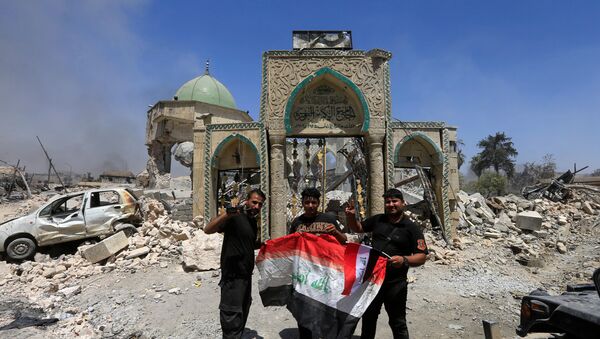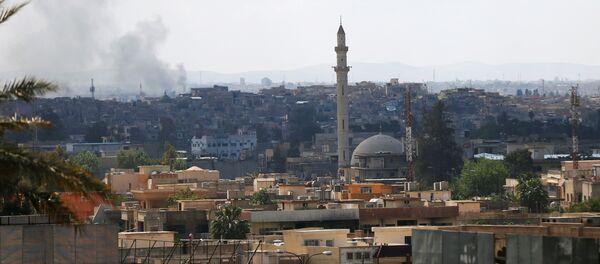The al-Nouri Mosque, freed from the terrorists, has a special significance to the campaign against Daesh as it was from this mosque that the terrorist group’s leader Abu Bakr al-Baghdadi proclaimed in the summer of 2014 that a new caliphate had been established. The destruction of the ancient mosque last week was widely regarded as the sign of Daesh's decline and impending defeat.
However, its loss was a heavy blow to Mosul residents, the state and the international community, one of many a devastation suffered in the course of the last few years.
Irina Bokova, the United Nations Educational, Scientific and Cultural Organization's (UNESCO) director-general, called the loss of the mosque a "cultural [and] human tragedy."
Famous for its leaning minaret, known as al-Hadba ("hunchback"), the mosque was built in the 12th century, and, most recently, survived the 2004 Battle of Mosul.
May Shaer, a Senior Project Officer with the UNESCO office for Iraq, told Sputnik that the organization was ready to "discuss and assist in future plans for al-Nuri Mosque."
UNESCO had been involved in the project for the preservation of the minaret with Governorate of Nineweh prior to the city’s occupation by the Daesh. The work on the minaret had to be interrupted, but the materials for the conservation had been completed and ready for use once the mosque was freed.
RESTORATION CHALLENGES
The Daesh has notoriously destroyed a large number of shrines and mosques and has reportedly been selling looted ancient artifacts to finance its activities. The losses include numerous major monuments in the Syrian city of Palmyra that a number of Russian experts helped restore, among them, the ancient Assyrian cities of Nimrud, Hatra and Ashur.
According to Shaer, the Al-Ramadi and Mosul museums in Iraq had also been dealt a heavy blow. In 2015, the Daesh released a video of its fighters smashing priceless artifacts in the Mosul Museum.
Safeguarding and restoring Iraq’s cultural heritage once the country is free from the Daesh, will not be an easy task and it will take efforts of a global scale.
"This [restoration work] includes comprehensive documentation, planning for conservation and management of heritage, and, carrying actual conservation works and protection measures. This would require significant financing as well as technical assistance and support," Shaer said.
Determining the right approach to the restoration of sites deliberately demolished by the Daesh will be one of the challenges, according to the UNESCO specialist.
"One challenge in terms of restoration of sites deliberately destroyed by Daesh, such as the sites blown up like Nimrud, would be the decisions that will be made on the approach to be undertaken for restoration (such as what will be restored, to what extent, and how…). All this requires accurate documentation, assessments and planning," Shaer said.
GLOBAL EFFORT
UNESCO called on the global community to join the work on the preservation of the cultural heritage in Iraq at an International Coordination Conference on the Safeguarding of Cultural Heritage in Liberated Areas of Iraq, held in February.
The US State Department and the Smithsonian announced a $400,000 project in April to help Iraq’s State Board of Antiquities and Heritage (SBAH) preserve Nimrud. The Smithsonian has been working with Iraq since 2014, creating a special guide for the Iraqi and Kurdish security forces to help protect the ancient monuments in the war zones.
The experts from the The Centro Ricerche Archeologiche e Scavi di Torino (CRAST, Center of Archeological Research and Excavation for the Middle East and Asia based in Italy’s Turin) told Sputnik that coordinated international effort was paramount to the success of the restoration of Iraqi monuments.
"The preservation of Iraqi heritage can be carried on only by means of a wide international cooperation that should involve all the archaeologists active in the country. Of course UNESCO might play a significant role too. The collaboration of international centers and institutions with the SBAH of Iraq and with Iraqi archaeologists is the only way to assure successful results," Stefano De Martino, a scientific director at CRAST, and a full professor of Hittitology at the University of Torino, said.
De Martino said the Iraqi-Italian Centre for the Restoration of Monuments in Baghdad was actively participating in training courses for Iraqi archeologists and restoration specialists.
"An international coordinating group is necessary for damage assessment, management and safeguard of important sites such as Nimrud, Nineveh and Hatra," Roberta Menegazzi, a member of the CRAST scientific board and a doctor of Archaeology of the Ancient Near East, said.
Menegazzi noted that CRAST was focused on the re-qualification of the Iraq Museum of Baghdad, which was heavily looted during the beginning of the Iraq war in 2003.
Iraq is overwhelmed by a host of problems, all of which require urgent solutions, and, first and foremost, helping the people who have suffered in the conflict. Removing the terrorist threat completely and rebuilding infrastructure are also very high on that list, whereas the restoring of ancient buildings may seem, in comparison, as a project to be set aside for more peaceful times. However, the iconic monuments, many of which have been reduced to heaps of rubble, have defined Iraqi cities for centuries, and in no small part are what made the cities unique homes for their residents, part of the intertwined culture and history of the people, and their return could be an important part of the general, greater recovery process.



